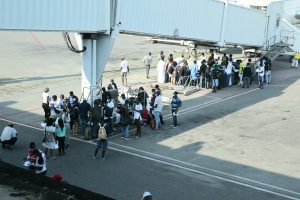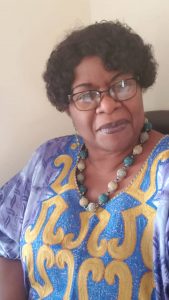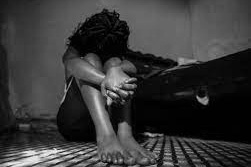By Nalova AKUA
Anita might have been ‘to hell and back’ after her desire to move on to greener pastures in Lebanon ended abysmally; yet, this hasn’t discouraged her in any way from going abroad to better her lot, if such opportunities come up again.
“If I have the opportunity of flying out today again, I won’t hesitate,” said the 26-year-old indigene of Batibo in the North West Region of Cameroon, speaking under an assumed name to protect her dignity
“I still play the American Lottery every year,” she said. “I love to work out of Cameroon because working standards out there are better than working standards in Cameroon.”
Anita left Cameroon for Lebanon after obtaining her GCE Advanced Level, in the hopes of getting a white-collar job.
“But when I arrived, I was told I would serve as a housemaid,” she said.
“I was treated like a slave. In Lebanon, housemaids work like slaves and are called slaves. You work round the clock. From 7a.m. to 7p.m. No resting days! You are forbidden from going out to stroll. It is as if you are in a prison. Prison is even better. You are supposed to be at the beck and call of your masters. Whether you are comfortable with the work conditions or not, you must finish your contract before leaving, failing which you will have to compensate them,” she said.
But there is more to Anita’s appetite for greener pastures than just job search. She belongs to the part of Cameroon’s English-speaking minority currently roiled by armed conflict. In 2016, English-speaking lawyers and teachers in Cameroon’s two Anglophone states took to the streets to protest the appointment of French-speaking teachers and magistrates in Anglophone schools and courts. The protests were met with a disproportionate use of force by government security forces and the arrest and detention of the leaders. Events then spiralled out of control and a separatist movement emerged, calling for the independence of the two Anglophone Cameroon regions of Northwest and Southwest which they call Ambazonia. The war has left more than 6,000 people dead, hundreds of thousands displaced internally, and at least 60,000 as refugees in neighboring Nigeria. Hundreds of thousands of children have been deprived of school and the local economy is in free fall owing to the war.
“We still have this situation where every Cameroonian feels that the grass is greener on the other side; I will not say they are wrong – because given the context in our country today – not everybody will want to live in Cameroon,” said Angelica Bih Mundi, Director, Social Protection of Persons Living with Disabilities and the Elderly, Ministry of Social Affairs.

“If you look at the situation in the North West and South West Regions, you realise that we have young people who have lost businesses, young Cameroonians who were involved in a lot of income-generating activities including farming,” she said.
“We have seen people who have even abandoned their jobs, hoping to find a better one out there.”
“People have risked their lives trekking over thousands of miles to get into countries like the United States of America. Some have even risked their lives at sea trying to cross over into Europe. When they finally don’t make it, sometimes, they come back now like refugees. They have this trauma of broken dreams,” she said.
Burden On Receiving Countries
Some 10,000 Cameroonians have tried to ask for asylum in the U.S. since 2016, many of them fleeing the unrest in the Anglophone regions of the country, according to Sylvie Bello, CEO of the Cameroon American Council, and Cameroonian American immigration lawyer Pryde Ndingwan. Some of them have been held in detention facilities for years.
The worsening humanitarian crisis resulting from the conflict in Cameroon pushed some U.S. lawmakers in July and October 2021 to petition the Department of Homeland Security to designate Cameroon for Temporary Protected Status (TPS), which means Cameroonian migrants entering across the southern U.S. border can’t be refused entry.
According to a recent Human Rights Watch report, hundreds of Cameroonians who had fled their country to the United States between 2017 and 2020 due to the crisis “faced arbitrary arrest and detention; enforced disappearances; torture, rape, and other violence; extortion; unfair prosecutions; confiscation of their national IDs; harassment; and abuses against their relatives.” Many also reported experiencing excessive force, medical neglect, and other mistreatment in Immigration and Customs Enforcement (ICE) custody in the US.
“The US government utterly failed Cameroonians with credible asylum claims by sending them back to harm in the country they fled, as well as mistreating already traumatized people before and during deportation,” said Lauren Seibert, refugee and migrant rights researcher at Human Rights Watch. “The Cameroon and US governments need to remedy these abuses, and US authorities should provide opportunities for wrongly deported Cameroonians to return and reapply for asylum.”
“We put all our hope in the USA when we went to seek refuge,” a 37-year-old man who was deported to Cameroon in October 2020 told Human Rights Watch.
“We did not imagine the US would return us like that.” He spent nearly three years in US immigration detention and was arbitrarily detained in Cameroon after his return. He remains in hiding.
In June 2021, at least 700 African migrant workers, among them Cameroonians, were rounded up by security officials of the United Arab Emirates as they were accused of “living and working in the UAE illegally.”

In 2020, net migration rate for Cameroon was -0.19 migrants per thousand population.
Today, Anita is a mobile phone vendor in Cameroon’s political capital, Yaounde. A job she does for a retail company for which she receives a little percentage of the amount sold. While she does this other task rain or shine, her past keeps haunting her.
“The fact that I didn’t lose my life gave me joy when I came back to Cameroon,” she said.
“Psychologically, I am okay, but I don’t want to go back to what happened,” she said. After pausing for about 30 seconds, she continued:
“For me, it is just a past, which should be buried. It is not a happy story to let people know because it will attract a lot of ridicule.”
“I was harassed sexually by both my employer and his children. They tried to rape me on several occasions. My employer’s son even threatened to kill me if I dared reveal his advances toward me. At one moment, I had to flee from the house to the immigration office. I was paid just FCFA 120,000(approximately USD 200) every month. Initially, I had to work for nine months, but given the circumstances, I left after six months,” she said.
The conflict in Cameroon stems from the country’s past, first as a German colony that was later split between France and Britain. The only two English speaking regions which make up about 20% of the total population are fighting for a change of a centralised governance system either through full independence or a return to a federal system of governance with equal status as was the case before the 1972 referendum. Over the years, persistent civil society calls and protest against the majority 80% French centralised government to stop all forms of marginalisation, were either ignored or met with repressive measures from state security forces. Today, critics continue to question the very essence of the five-year-long conflict which they believe could easily have been avoided.
“The Anglophone crisis is the first of its kind in the world to be a self-inflictive war given it stemmed from peaceful corporatists’ demands of teachers and lawyers which was later hijacked by separatists who deliberately turned these genuine demands into the madness of the so-called struggle of independence,” said Dr Elvis Mbwoge, political scientists, security & counterterrorism expert. Mbwoge is also lecturer in the Faculty of Laws & Political Science, University of Buea, in the crisis-hit South West Cameroon.
“Cameroonians have enjoyed relative peace than most countries in the world to the extent that they do not understand fully the concepts and the consequences of secession and war,” he said.
“It’s unfortunate our people’s inexperienced, brainwashed and politically premature minds underestimated the weight of war. I believe the government of Cameroon is aware of this reality the reason they too are reluctant to declare a full-scale war against armed secessionists. The government still believes these are misguided youths who deserve a second chance. That is why this crisis seems protracted this far.”
The Cameroon Anglophone conflict has deadlocked; while leaders of the Ambazonian struggle insist that there is no turning back – that what they want is independence and not even the erstwhile two-state federation; the government insists the form of state of Cameroon is non-negotiable.
“Right now, both parties are unable to back the current hard-line stands of winning in the battlefield,” according to David Otto, director of counterterrorism for the Geneva Centre of African Security and Strategic Studies.
“These armed groups consist of locals who have a mastery of the local terrain and enjoy protection, trust and support from the local communities – these factors render military strategies ineffective and often counter-productive – leading to multiple casualties,” he said.
“As expected over the years, the separatist groups have become more structured and experienced, improving the impact of attacks deploying Home Made Improvised Explosive Devices. In every internal conflict like the one in the English speaking regions in Cameroon, the state has the higher moral authority to promote a credible channel for sustainable peace through dialogue and negotiations not the separatist. The earlier both sides review the existing options for a peaceful settlement, the better for the stability of all stakeholders.”
Torn Between Crisis, Human Trafficking
Anita’s story is unfortunately all too common to many Cameroonians fleeing the present conflict. Another returnee, 29-year-old Ruth (not her real name), still from the crisis-hit North West Region, share similarly painful experiences.
“My employer was an old lady aged 86,” Ruth said after spending slightly over two years in Kuwait.
“I was taking care of her alone,” she said.
“She was handicapped. I had to push her on a wheelchair every evening to the Mosque. I cooked for her, cleaned her,” she said, adding there was even worse she did for a FCFA 140,000(approximately USD234) monthly pay.
“Before leaving for Kuwait, the intermediary who facilitated my travel lied to me I was going to be a teacher of English. When I arrived, I was told that I was going to be a domestic servant instead.
“The old woman was very arrogant, insulting and hot-tempered. Some days, she won’t even allow me to sleep. She would want me to be massaging her while she was asleep. It was a difficult thing to do, but then I had no choice. At times, she will accuse me of stealing her money; tearing her dresses or soaking them; she was very nagging. There was a day she even locked me out for coming back late from an errand. She never trusted me. She would never allow me in her house if she went out to stroll for fear I will steal her dresses.”
Beatrice Titanji, CEO of Women’s Guild for Empowerment NGO in Cameroon attributes such ventures to the ignorance about human trafficking among many in Cameroon.

“The first victim we had was in a plane, with a passport and a visa going to Kuwait and didn’t even know where Kuwait was found,” Titanji, who has chronicled the struggles of Cameroonian returnees in her book: “Curbing the tide of human trafficking and slavery” said.
“When I meet most of them, I just give them pen and paper and ask them:
“write! Tell this story. Write down all what happened to you”. And when they do that, it is part of the trauma-healing,” she said.
“The problem is not just for the poverty, but also the lack of jobs. They are running away from the crisis. Talking about the crisis and human trafficking, it becomes very complex because you go into a community and you have survivors of human trafficking who are now internally displaced persons (IDPs) themselves.
“The reason why girls are on the higher level is because they talk. The boys get very shy and their ego doesn’t let them talk about what they have gone through. They feel like failures. They don’t talk even to their family members especially in situations where their family members financed their trip. In some cases, some parents ask them to refund the money they spent despite knowing that they came back empty-handed. There is a lot of blame game in our society: Why did they go? People keep asking them. As we speak, if you go to Douala or Yaounde, you will find girls at midday boarding Ethiopian Airlines but they won’t be able to tell you where exactly they are going.”
Bih Mundi of the Cameroon social affairs ministry agrees, and discloses that “a lot of feuds within family settings have been reported” as a result of these abortive journeys.
“We first work with families that have to receive them like prodigal sons; but also, we encourage the migrants to go back to their families though with a lot of remorse, but not self-crucifixion,” she said.
“When these people come back, they lose self-esteem. They don’t even feel like their children should call them daddy or mummy anymore because they really feel like they are worthless. Bringing back this self-esteem takes some time.”
Ruth spent FCFA 400,000 (approximately USD668) to travel to Kuwait. She was able to save FCFA 1.2 million (approximately USD2,000) at the moment she returned, despite using part of it to cater for herself, contrary to what her contract stated. She has vowed never to try such ventures again.
“We created a whatsApp group: ‘Cameroonians in Kuwait’,” she said.
“Many were revealing their trauma and need for help in the group. Some were crying for help, others complained about maltreatment from their employers; how they were being harassed or raped by their employers; some were forced to sleep with pets in the same room, but there was nothing we could do to help them.”
Before leaving Kuwait, Ruth’s replacement – yet another Cameroonian – had already been brought in.
“But the girl was blindfolded,” she recalls.
“They didn’t want us to have any eye contact. I don’t know if they feared I was going to tell her the nightmare that awaited her.”
Silent Revolt, Brutal Killings
Cameroon has been ranked in the top three on the Norwegian Refugee Council’s list of world’s most neglected displacement crises for the past four years, due to what the humanitarian group terms “a consistent lack of political engagement and international attention.” The crisis in the Northwest and Southwest regions of Cameroon has seen a large number of attacks on healthcare, with health workers or patients threatened, abducted, injured, or killed, as well as medical infrastructures damaged or destroyed. School children aren’t left out.
Violence in the conflict is often driven by a specific cycle of violence, where atrocities committed by the military trigger violence from separatists, or where atrocities committed by the separatists trigger violence from the military.
At least 11 Cameroonian soldiers died Saturday, Nov. 13, 2021, when suspected Anglophone separatist militants ambushed them with Improvised Explosive Devices (IEDs) at Matazem, Santa Sub-Division in the country’s embattled North West Region.
The attack came just a day after a 9-year-old pupil was shot dead in the same region by a Cameroonian police constable in an attempt to stop a driver who allegedly refused to comply, triggering violent protests from the surrounding town.
The death enraged residents who were still incensed by an Oct. 14, 2021 tragedy when a member of the Cameroonian military had killed a five-year-old child in Buea, capital of the South West Region, also roiled in revolt. That incident also was an attempt to halt a vehicle whose driver reportedly refused to comply. The officer was subsequently beaten to death by the angry mob.
The spokesman of the Cameroonian army, Atongfack Guemo Cyrille Serge in a press release following the incident, admitted that the reaction of the deceased officer was “inappropriate…unsuited to the circumstances, and clearly disproportionate to the irrelevant behavior of the driver.” “Any citizen misconduct (such as refusal to cooperate and disobedience/disrespect of security officer) could be subject of suspicion and eventual immediate target of the forces of law and order.
Regrettably, the victims are misplaced targets,” wrote Suh I Fru Norbert, lecturer in the Department of Political Science and Comparative Politics in Cameroon’s University of Buea said. “Both incidents may not have been premeditated, [but] they coincided in two regions sharing a common public security challenge—which is disruption of public life,” Norbert said.
On November 24, 2021, unidentified gunmen stormed a state-run secondary school in Ekondo Titi, Ndian Division of South West Cameroon, killing four students and a female teacher. Seven other students were wounded. A similar attack happened in the same region on October 24, 2020, when gunmen opened fire in a school killing seven children and wounding 13 others. Both the Cameroon military and the leaders of the Ambazonia secessionist movements blame each other for the separate attacks till this day.
“A dozen secessionist assailants, deceitfully dressed in military gear and equipped with automatic weapons, stormed the premises of [the school] and started firing indiscriminately in the direction of the classrooms where students and teachers were already in class, before activating an improvised explosive device,” Atonfack Guemo Cyrille Serge, the spokesman of the Cameroonian army said in a statement following the incident.
“The assailants belong to a terrorist group headed by the so-called general “ten kobo,” who is equally responsible for the kidnapping and incommunicado holding of [six] divisional delegates [in the same locality] on June 15, and the murder of [one of the] divisional delegates,” he said.
But Chris Anu, the then communications secretary of the United States’ of America-based Interim Government of Ambazonia pushed back, insisting “Ambazonia restoration forces did not carry out the attack.” “They [Cameroon military] carried out the killing of these school children in Ekondo Titi hoping that Ambazonia restoration forces will be held responsible,” Anu said.
He went on: “Cameroon soldiers have a pedigree for killings like these ones and they must be held accountable. They went to Kumba and killed students. They killed a child going to school in Buea. They killed another child coming back from school in Bamenda. French Cameroon soldiers are known to attack even sick people in hospitals as was the case in Shisong and Kumba. French Cameroon has been carrying out these dastard acts hoping that the international community will place the responsibility over Ambazonian restoration forces.”
Otto of the Geneva Centre of African Security and Strategic Studies is not least surprised by this blame game – pointing to the challenging nature of 21st century asymmetric warfare – where the innocent and vulnerable groups suffer the most from its impact without recourse to justice. “Most insurgency groups that depend on information, trust and support from local communities refrain from claiming responsibility for attacks that either kill or injure the most vulnerable population – particularly women and children– it is no surprise that both the government and Ambazonia separatist groups will do all they can to indict the other while distancing themselves from any responsibility of these attacks for fear of losing any local and international support,” he says.
“Attacks of this nature almost certainly form the core of propaganda to be exploited by all parties.”
“The Cameroon government will use the incident to paint the separatist as evil and further cement the terrorist label at all levels. For Ambazonia separatists, they’ll paint the incident as a state-sponsored strategy to use pseudo-groups or military men dressed in civilian attire to launch these attacks as a sabotage strategy to Ambazonia independent goals. It’s a combination of both sides exploiting the core elements of attention; fear and propaganda in counter insurgency to make progress by any means,” according to the security analyst.
Perhaps the deadliest civilian massacre in the unfolding conflict is the Ngarbuh incident of February 14, 2020 where an attack on a village in the crisis-hit North West region resulted in the death of at least 21 people, including 13 children and one pregnant woman. The Cameroon government later acknowledged the army’s role in the massacre after initially denying responsibility.
Way Forward?
The crisis is in the two Cameroon Anglophone regions is today in a stalemate because each of the belligerents – government and separatists – believes it can defeat the other in battle.
Cameroon security forces have perfected a counter insurgency strategy led by a massive focus on kinetic operations, deployed in an environment and conflict best suited for non-kinetic operations or a well-balanced combination of both.
After 5 years, Otto believes it is safe to conclude that the only credible parties who potentially have a 100% interest for the conflict to be resolved is Cameroonians united for sustainable peace.
“They have the people’s ability to force the government of Cameroon and Ambazonia separatist group’s to yield to a peaceful framework and stop the conflict – At best and beyond issuing strong statements, the UN , France , UK, US can only facilitate the process of peace in Cameroon – they do not have neither the required geopolitical interest nor the urgency to fix a crisis considered as internal on behalf of both parties. If they did, the so called Anglophone crisis would not have reached the current level of deterioration experienced on a daily basis,” he says.
This is the 5th year of the conflict and no side can claim on the balance of capacity, that it can defeat the other anytime soon, he says.
“The form of the state is non-negotiable and independence is a no turning back is a respectable starting position. In the phase of negotiations, positions are likely to shift depending on what is at stake for each party,” said Otto.
Dr. Simon Munzu, civil society leader and former Assistant Secretary General of the United Nations agrees, and insists “There is no military solution to this crisis.”
“Separatists want to prove that they are in control of the English-speaking territory that they call the ‘homeland’. Their strategy has largely succeeded to disrupt the livelihoods and cripple the social, economic and cultural activities of most of the population in that territory,” he says. However, he went on, “they are far from achieving their primary objective, which is to route the Cameroonian state out of the English-speaking part of the country and ‘restore the independence’ of this territory.”
Dr Munzu suggests the government of Cameroon has to acknowledge that two Cameroons (English-speaking and French-speaking) came together in 1961 to form a union of equals, and stop the “pursuit of its programme of assimilation and subjugation of the English-speaking territory and its population.”
The separatists, on the the other hand, have to acknowledged that the Southern Cameroons “voted to achieve independence in 1961 by joining the Republic of Cameroon”, thereby forging the two into one sovereign and independent country, and “drop their ambition to ‘restore the independence of the Southern Cameroons’.”
“Thereafter, the Cameroonian people should hold a national conference to establish and implement a constitutional framework for the new governance of their country that meets their aspirations across the ten regions.”
He laments: “All [peace efforts] have failed because the government is acting in bad faith. It refuses to acknowledge the exact nature of the Anglophone problem. It, therefore, refuses to adopt real solutions that could resolve the problem and end the crisis. The measures it has taken so far are purely cosmetic.”








